PEP小学六年级英语Unit6课文重难点及复习题
人教PEP版六年级英语上册Unit 6 单元整理与复习 单元复习课件 授课课件
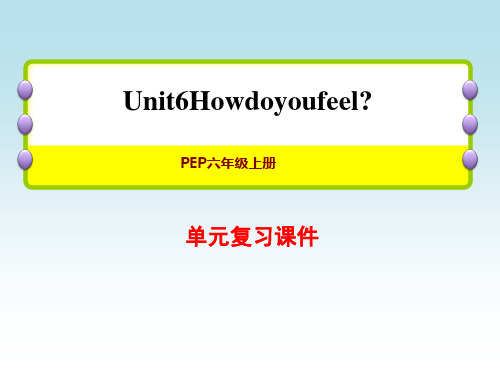
domoreexercise
wearwarmclothes
takeadeepbreathand
counttoten
back
I’mill. whatshouldIdo?
Youshouldseeadoctor.
WhatshouldIdo?
Youshould_____.
back
Should的用法:
should为情态动词,无人称和数的变化,意为“应 该”,其后接动词原形,(should+动词原形)表 示建议某人做某事。 Youshouldgotoschoolearly. Weshoulddomoreexercise.
三、听录音,判断正(T)误(F)。
() T1.Onarass. () 2.Robinsitsonanant. Theantisveryafraid.
() 3.Thenextdayisarainyday. () F4.Robinisnotworriedwhenheisstuckinthemud.
4. beangrywithsb.生某人的气
beangryaboutsth.因某事而生气
Don’tbeangrywithhim. Heisonlyachild. 不要生他的气,他还只是个孩子。
John’sfatherisangryabouthismistake. 约翰的父亲因他所犯错误而生气。
5. worry动词;worryabout担心…… Don’tworryaboutJim.不要担心吉姆。 beworriedabout担心……(worried为形容词。) Myuncleisworriedaboutmycousin. 我叔叔在担心我堂弟。
3. shouldshedoctorseea. ___S_h_e_s_h_o_u_ld_s_e_e_a_d_o_c_t_o_r._____
2021年人教PEP,六年级上册英语期末知识点分类复习与检测UNIT6(含答案及听力材料),(2)
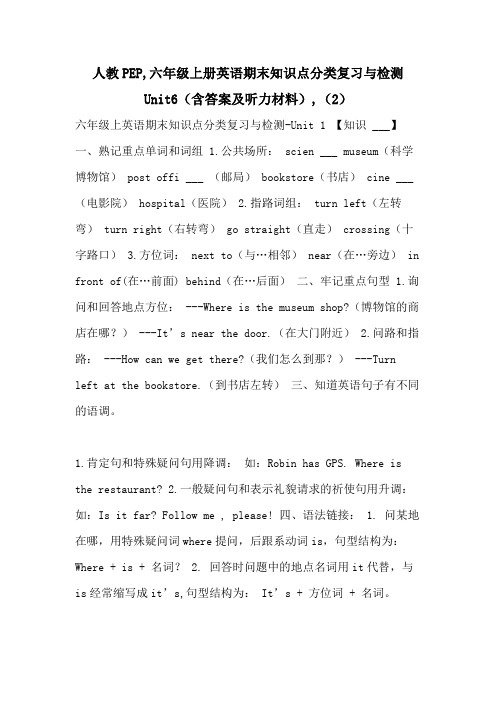
人教PEP,六年级上册英语期末知识点分类复习与检测Unit6(含答案及听力材料),(2)六年级上英语期末知识点分类复习与检测-Unit 1 【知识 ___】一、熟记重点单词和词组 1.公共场所: scien ___ museum(科学博物馆) post offi ___ (邮局) bookstore(书店) cine ___(电影院) hospital(医院) 2.指路词组: turn left(左转弯) turn right(右转弯) go straight(直走) crossing(十字路口) 3.方位词: next to(与…相邻) near(在…旁边) in front of(在…前面) behind(在…后面)二、牢记重点句型 1.询问和回答地点方位: ---Where is the museum shop?(博物馆的商店在哪?) ---It’s near the door.(在大门附近) 2.问路和指路: ---How can we get there?(我们怎么到那?) ---Turnleft at the bookstore.(到书店左转)三、知道英语句子有不同的语调。
1.肯定句和特殊疑问句用降调:如:Robin has GPS. Where is the restaurant?2.一般疑问句和表示礼貌请求的祈使句用升调:如:Is it far? Follow me , please! 四、语法链接: 1. 问某地在哪,用特殊疑问词where提问,后跟系动词is,句型结构为:Where + is + 名词? 2. 回答时问题中的地点名词用it代替,与is经常缩写成it’s,句型结构为: It’s + 方位词 + 名词。
过关检测 Listening Part(共30分)[:学科网ZXXK] 一、听录音,圈出你所听到的单词。
(5分) 1.post ___n postcard post offi ___ 2.music museum cine ___ 3.bookstore shoe store story book 4.turn left next to turn right 5.straight crossing hospital 二、听录音,判断下列 ___与你听到的内容是否相符,相符的打“T”,不相符的打“F”。
人教PEP版小学英语六年级上册Unit 6复习导学案

六年级上册英语Unit 6复习导学案姓名_________ 分数__________一.英汉互译(每空2分,共50分)。
生气的________ 难过的________害怕________担心的,发愁的____________深深吸一口气__________________穿__________ 看病_____________数到十________________做更多的运动________________ 穿暖和的衣服________________ 追赶____________老鼠___________ 邪恶的,坏的______________(使)受伤______________有病;不舒服______________wrong__________觉得,感到_____________sit______________草坪______ stuck_______ mud__________pull_______ everyone__________ant__________ hear_____________二、根据汉语提示补全句子。
(5分)1. If you are ill, you should __________________________. (看医生)2. If you want to be strong, you should ________________________. (做更多的炼)3. If you feel cold, you should ____________________________. (穿暖和的衣服) 。
4. If you are angry, you should ______________________(深吸一口气)and _______________. (数到十)三、阅读短文,选择正确答案。
(5分)I am a schoolboy. I have lessons from Monday to Friday. On Sunday morning, I usually get up very late. I wash my face and then go out to do morning exercises. It is about nine o'clock. After I eat my breakfast. I often go to the park with my parents. The park is not far (远) from our home, so we go there by bike. It takes us about ten minutes to get there by bike. There are many people in the park. They are men and women, old and young. Parents must look after their children. There is a big lake in the middle of the park. Some children are swimming, some are boating with their parents. I like boating very much. I want to boat, too. My parents buy three tickets. We have a good time there. How happy we are!( )1.I have lessons ______days a week.A. fourB.fiveC. sixD. seven( )2. I often ______ on Sundays.A. go to schoolB. get up earlyC. get up lateD. go to bed late( )3. On Sundays, there are _______ people in the park.A. muchB.very muchC.a littleD.lots of( )4. I like ______ very much.A.playing basketballB.boatsC.swimmingD.boating( )5. I 'm boating in the park with my ______.A.good friendsB.father and motherC.classmatesD.teachers四、作文写一段话,描述一下,你自己和周围人的不同的心情(不少于5句话)_________________________________________________________________PEP小学英语六年级上册重点单词和句型练习一、重点单词Unit 1:by ( ) foot( ) bike( ) bus( ) train( ) how( )go to school() traffic()traffic light()traffic rule()stop()wait() get to()Unit 2library( ) post office( ) hospital( ) cinema( ) turn( ) bookstore( ) where( ) please( )next to( ) right ( ) left( ) straight( )then ( )Unit 3next week( ) this morning( ) this afternoon( )this evening ( ) comic book( ) post card( )newspaper( ) buy( )Unit 4hobby( ) ride a bike--riding a bike( ) dive--diving( )play the violin—playing the violin( ) make kites—making kites( ) collect stamps—collecting stamps( ) live –lives( ) teach--teaches( ) go--goes( ) watch--watches( ) read--reads( ) does doesn’t=does notUnit 5singer( ) writer( ) actor( ) actress( ) artist( ) TV reporter( ) engineer( ) accountant( ) policeman( ) salesperson( ) cleaner( ) where() work()Unit 6rain( ) cloud ( ) sun( ) stream( ) come from( ) seed( ) soil( ) sprout ( ) plant( )should ( ) then( )Unit 1: ▁▁(经,乘) ▁▁(脚) ▁▁(自行车) ▁▁(公共汽车) ▁▁(火车)▁▁(怎样) ▁▁▁▁(上学)▁▁▁▁(交通)▁▁▁▁▁▁(交通灯)▁▁▁▁▁▁(交通规则)▁▁(停,停车站)▁▁(等待)▁▁▁▁(到达)Unit 2 ▁▁▁▁(图书馆) ▁▁▁▁(邮局) ▁▁▁▁(医院) ▁▁▁▁(电影院)▁▁(转弯) ▁▁▁▁(书店) ▁▁▁(在哪里,到哪里) ▁▁▁(请)▁▁▁(与…相邻) ▁▁▁ (右边) ▁▁(左边) ▁▁▁(成直线地) ▁▁▁(然后)Unit 3 ▁▁▁▁▁(下周) ▁▁▁▁▁(今天上午) ▁▁▁▁▁(今天下午)▁▁▁▁ (今天晚上) ▁▁▁▁(漫画书) ▁▁▁▁(明信片) ▁▁▁▁ (报纸) ▁▁▁(购买)Unit 4▁▁▁(爱好) ▁▁▁▁▁--▁▁▁▁▁▁(骑自行车) ▁▁▁--▁▁▁(跳水) ▁▁▁▁▁▁—▁▁▁▁▁▁▁(拉小提琴) ▁▁▁▁▁—▁▁▁▁▁▁▁(制作风筝) ▁▁▁▁▁▁—▁▁▁▁▁▁(集邮) ▁▁▁–▁▁▁(居住)▁▁▁▁--▁▁▁▁(教) ▁▁--▁▁▁(去) ▁▁▁--▁▁▁(看)▁▁--▁▁▁(读,看) does doesn’t=▁▁▁▁Unit 5▁▁▁▁(歌唱家,歌手) ▁▁▁▁(作家) ▁▁▁▁(男演员) ▁▁▁▁(女演员) ▁▁▁▁(画家) ▁▁▁▁(电视台记者) ▁▁▁▁(工程师) ▁▁▁(会计) ▁▁▁▁(男警察) ▁▁▁▁▁▁(销售员) ▁▁▁(工作)▁▁▁▁(清洁工) ▁▁▁▁(在哪里,到哪里)Unit 6▁▁▁(雨) ▁▁▁ (云) ▁▁▁(太阳) ▁▁▁▁(河,溪) ▁▁▁▁(来自,从…来) ▁▁▁(种子) ▁▁▁(土壤) ▁▁▁ (苗,芽) ▁▁▁(植物,种植) ▁▁▁(应该) ▁▁▁▁(然后)二、单词分类1)交通方式:by bus, by train, by subway, by ship, by plane, by car, on foot2)文具书籍:dictionary, newspaper, comic book, post card3)职业:singer, writer, TV reporter, actor, actress, engineer, accountant, salesperson, policeman, policewoman,artist, cleaner4)V-ing形式:riding a bike, collecting stamps, diving, making kites, playing the violin5)第三人称单数形式:lives,teaches, watches, goes, does, doesn’t6)公共场所:library,post office, cinema, hospital, science museum, bookstore7)方位:east, west, south, north, turn left, turn right, go straight8)交通灯; red light, yellow light, green light9)自然:sun, cloud, rain, vapour, stream六年级上册四会句子1.你是怎样去上学的?▁▁▁▁▁▁▁▁2.通常我走路去上学。
六年级上册英语课件Unit6复习课_人教PEP(秋)
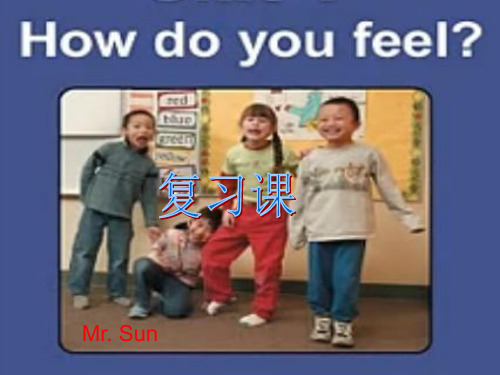
11.听到我很难过。I’m sorry __so_r_r_y ___to___ that. 12.不要生气,你应该深吸一口气并且数到10. Don’t __b_e__ angry.You _sh_o_u_l_dtake a deep_b_r_e_a_th and _c_o_u_n_t __to___ ten. 13.不要着急,让我们来帮助你。 _D__o_n_’t _w_o_r_ry___._L_e_t_ __u_s___ help you. 14.每一个人在晚会上很开心。 Everyone __is___ happy at the party.
5.__A___ you happy now?—Yes,I ____.
A.Are; am B.Do; do C.Are; do
6.Look! __C__ the cat chasing a mouse?
A.Does B.Do C.Is
7.Tom,__B__ they going to see a film tonight?
对…感兴趣 be interested in
单项选择。
1.--__B_____ is the weather today?
—It’s sunny and warm.
A.Where
B.How C.What
2.--__A__ do these pictures make you feel?
--They make me angry.
You have to believe in yourself. That's the secret of success. 人必须相信自己,这是成功的秘诀。
做爆米花
make popcorn
拿一些饮料
get some drinks
新人教PEP版英语六年级上册 Unit 6 单元整理与复习 授课课件
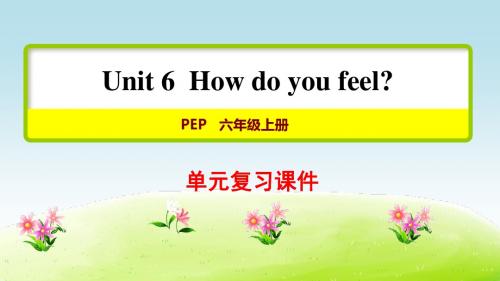
__H__o_w_ _d__o_es__ she __f_e_el__?
当堂检测
三、读问句,选择对应的答语。
( C ) 1. What should I do ?
A. I want to be a nurse.
10. pull …out of…把…从…拉出来
John pulls Lily out of the water.
约翰把莉莉从水里拉出来。
back
一、听录音,根据首字母填空。 Sam and Sarah are talking about a ca_r_t_o_o_n__. It is
about a cat. He is a po_l_i_ce___ o_f_f_ic_e_r_.He chases the mice. They are af_r_a_id___ ___o_f __ him. The mice hurt people. The cat is an_g_r_y___ _w__it_h___ them. Sam think their cat may be chasing a mo_u_s_e____ now.
4. be angry with sb.生某人的气 be angry about sth.因某事而生气 Don’t be angry with him. He is only a child. 不要生他的气,他还只是个孩子。
John’s father is angry about his mistake. 约翰的父亲因他所犯错误而生气。
1. wait for+人/ 车 等待某人或车。 I’m waiting for a bus. 我正在等公共汽车。
新人教PEP版六年级上册小学英语Unit 6单元知识梳理卷
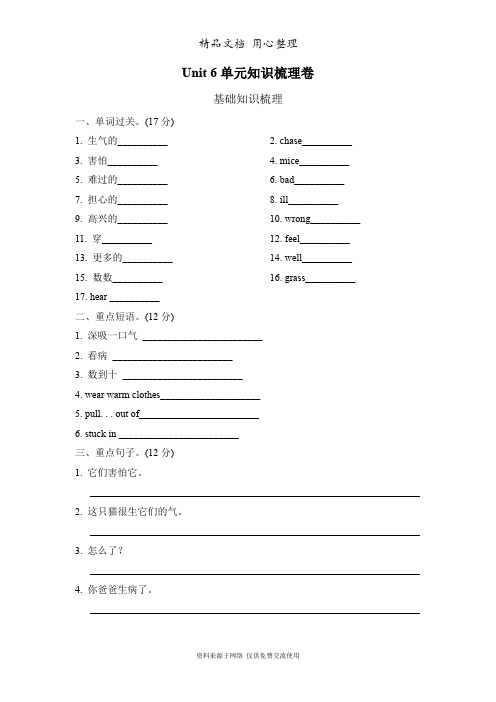
Unit 6单元知识梳理卷基础知识梳理一、单词过关。
(17分)1. 生气的__________2. chase__________3. 害怕__________4. mice__________5. 难过的__________6. bad__________7. 担心的__________ 8. ill__________9. 高兴的__________ 10. wrong__________11. 穿__________ 12. feel__________13. 更多的__________ 14. well__________15. 数数__________ 16. grass__________17. hear __________二、重点短语。
(12分)1. 深吸一口气________________________2. 看病________________________3. 数到十________________________4. wear warm clothes____________________5. pull. . . out of________________________6. stuck in ________________________三、重点句子。
(12分)1. 它们害怕它。
__________________________________________________________________ 2. 这只猫很生它们的气。
__________________________________________________________________ 3. 怎么了?__________________________________________________________________ 4. 你爸爸生病了。
__________________________________________________________________5. 他今天早上应该去看病。
新版pep六年级英语上册Unit6复习完美版.ppt
矿产资源开发利用方案编写内容要求及审查大纲
矿产资源开发利用方案编写内容要求及《矿产资源开发利用方案》审查大纲一、概述
㈠矿区位置、隶属关系和企业性质。
如为改扩建矿山, 应说明矿山现状、
特点及存在的主要问题。
㈡编制依据
(1简述项目前期工作进展情况及与有关方面对项目的意向性协议情况。
(2 列出开发利用方案编制所依据的主要基础性资料的名称。
如经储量管理部门认定的矿区地质勘探报告、选矿试验报告、加工利用试验报告、工程地质初评资料、矿区水文资料和供水资料等。
对改、扩建矿山应有生产实际资料, 如矿山总平面现状图、矿床开拓系统图、采场现状图和主要采选设备清单等。
二、矿产品需求现状和预测
㈠该矿产在国内需求情况和市场供应情况
1、矿产品现状及加工利用趋向。
2、国内近、远期的需求量及主要销向预测。
㈡产品价格分析
1、国内矿产品价格现状。
2、矿产品价格稳定性及变化趋势。
三、矿产资源概况
㈠矿区总体概况
1、矿区总体规划情况。
2、矿区矿产资源概况。
3、该设计与矿区总体开发的关系。
㈡该设计项目的资源概况
1、矿床地质及构造特征。
2、矿床开采技术条件及水文地质条件。
【Pep版】小学英语六年级上册专练习题:Unit 6复习题
六年级上册英语Unit 6复习导学案姓名_________ 分数__________一.英汉互译(每空2分,共50分)。
生气的________ 难过的________ 害怕________担心的,发愁的____________深深吸一口气穿__________ 看病_____________数到十做更多的运动________________ 穿暖和的衣服________________ 追赶____________老鼠___________ 邪恶的,坏的(使)受伤______________ 有病;不舒服______________wrong__________觉得,感到 sit 草坪______ stuck_______mudpull everyone ant hear 二、从方框中选择适当的句子完成对话,把正确的句子规范书写在横线上,有两项多余。
( 每空3分,共30分 )A: What’s this cartoon about?B: The cat is a police officer.A: Cool!B: He chases the mice.A:Why?B: They hurt people.A:Dialogue twoA: Sarah, Sam, come ,here, please.B:A: Your father is ill. So we can’t go to the zoo today.B: Oh,no!A: We can go next time.B:A:Not well.三、根据汉语提示补全句子。
(5分)1. If you are ill, you should __________________________. (看医生)2. If you want to be strong, you should ________________________. (做更多的炼)3. If you feel cold, you should ____________________________. (穿暖和的衣服) 。
新PEP版小学英语六年级上册Unit 6单元知识梳理卷
Unit 6单元知识梳理卷基础知识梳理一、单词过关。
(17分)1. 生气的__________2. chase__________3. 害怕__________4. mice__________5. 难过的__________6. bad__________7. 担心的__________ 8. ill__________9. 高兴的__________ 10. wrong__________11. 穿__________ 12. feel__________13. 更多的__________ 14. well__________15. 数数__________ 16. grass__________17. hear __________二、重点短语。
(12分)1. 深吸一口气________________________2. 看病________________________3. 数到十________________________4. wear warm clothes____________________5. pull. . . out of________________________6. stuck in ________________________三、重点句子。
(12分)1. 它们害怕它。
__________________________________________________________________ 2. 这只猫很生它们的气。
__________________________________________________________________ 3. 怎么了?__________________________________________________________________ 4. 你爸爸生病了。
__________________________________________________________________5. 他今天早上应该去看病。
人教PEP版英语六年级上册Unit 6 How do you feel 单元复习课件
“Don’t worry, little ant. I won’t sit on you,” says
Robin.
Part B Read and write
The next day, it is raining. Robin is in the park. He
is stuck in the mud. He is worried.
_H_o_w___d_o_e_s__A__m__y_f_e_e__l?___________
4. these children angry with the woman is (.)
_T_h_e__w__o_m__a_n__i_s_a__n_g_r_y__w_i_t_h__th__e_s_e children.
生病___i_l_l ___
有毛病__w_r_o_n_g__
觉得___fe_e_l___
健康,身体好___w_e_ll___
草坪__g_r_a_s_s__
听见__h_e_a_r___
担心__w_o_r_r_y__
陷住__s_t_u_c_k__
拉拽__p__u_ll___
每人_e_v_e_r_y_o_n_e
按要求完成句子。
5. It’s cold.(请给出你的建议) _Y_o_u__s_h_o_u_l_d__w_e_a__r_w_a__rm___c_lo__th_e__s_. ______
6. I’m ill.(请给出你的建议) _Y_o_u__s_h_o_u_l_d__s_e_e__a_d__o_c_t_o_r.____________
Sam: Why?为什么
be afraid of某人 害怕某人
Sarah: Because the mice are bad. They hurt 因为people. The cat isbeaannggryrywwiitthh某t人he生m某. 人的气
- 1、下载文档前请自行甄别文档内容的完整性,平台不提供额外的编辑、内容补充、找答案等附加服务。
- 2、"仅部分预览"的文档,不可在线预览部分如存在完整性等问题,可反馈申请退款(可完整预览的文档不适用该条件!)。
- 3、如文档侵犯您的权益,请联系客服反馈,我们会尽快为您处理(人工客服工作时间:9:00-18:30)。
一.重点单词和短语。
angry生气的afraid害怕的sad难过的worried担心的wear 穿happy高兴地more 更多的wait for sb/sth 等待某人/某物feel angry感觉很生气see a doctor看病take a deep breath 深吸一口气count to ten数到十a little worried有一点点担心be angry with…与...生气be afraid of ...害怕.....do more exercise做更多的运动wear warm clothes穿暖和的衣服wear more clothes穿更多的衣服get some drinks拿一些饮料have some popcorn 吃一些爆米花chase the mice追赶老鼠come here来这里(反义词)go there 去那边二.重要句型:1.—How do you feel? —I am sad. /I feel sad.2.—How does he/she feel?— He/ She is sad. He/ She feels sad.3.—What should I/you/he/she do?—You/He /She /I should take a deep breath and count to ten.4.We shouldn’t hurt ants.我们不应该伤害蚂蚁。
5.We can go next time.下一次(next,意为“下一个......”)6.He is stuck in the mud. 他陷在泥里了。
b e stuck in... 陷在....里7.Please don’t sit on me. I won’t sit on you.8.It is a sunny morning = It is sunny. 用来回答天气情况的句型.It’s + a + 描述天气的形容词+ morning/day/...= it is + 描述天气的形容词。
如果是询问的话,有两种句式表达:What is the weather like?= How is the weather? 天气如何?描述天气的形容词:sunny晴朗的snowy下雪的rainy下雨的cloudy多云的windy有风的9. It is the ant and all of his friends. 原来是那个小蚂蚁和它的朋友们。
all of 全部的......10. T hey pull Robin out of the mud. 它们把罗宾从泥土里拉出来。
p ull ... out of sth 从...把...拉出来p ull out 拉出来, of 从......地方The monkey king throws popcorn away of the tree.I get out of the teacher’s office.11. My favorite TV show is on soon.我最喜爱的电视节目不久上映。
在这里,on 不是介词“在......上面”的意思,在这里它是形容词,意为“开着的;发生着的,正在进行中的” The light is on. 灯还开着12.He must be making lots of popcorn.他必须做更多的爆米花。
must也是情态动词,其后要加动词原形,意为“一定,必须”He is making lots of popcorn → He must be making lots of popcorn.You are joking. → You must be joking.13. I ’m a little worried now.我现在有一点点担心的。
a little,意为“一点点...” , 可放在形容词或者不可数名词前面,表示一点点..I’m a little hungry 我有一点点饿。
新课标第一网There is a little water in the bottle. 瓶子里还有一点点水。
14. But they take a long time to grow. 它们要花上很长一段时间来生长在这个句子里,to grow 是用修饰它前面的名词time,time togrow,即“生长的时间”,用动词不定式后置的方式来修饰名词的做法是非常常见的。
She make a decision to watch TV I have a good friend to play with名词动词不定式名词动词不定式三.重点句型分析。
1.be + 表示情绪的形容词(sorry, angry, sad, worried, afraid, happy,excited, great surprised…)等,以及描述感受的ill,hungry,warm,cold等单词。
2.They are afraid of him.他们害怕它。
(此句中be afraid of 意为“对...是很害怕的”)。
例如:I am afraid of my maths teacher. 我害怕我的数学老师。
Children are always afraid of ghost. The mice are afraid of cats.3.The cat is angry with them.这只猫很生他们的气。
(此句中beangry with意为“ 对某人生气”)。
例如:I broken the cup.My mother is angry with me. 我打碎了杯子。
妈妈对我很生气。
Because Mike doesn’t finish homework,the teacher is angry with him.4.What’s wrong? —Your father is ill. 怎么了? 你爸爸病了。
What ’s wrong?此句用于询问对方有什么问题或有什么不顺心的事情,直译:“ 什么是错的,有问题的?”引申:“ 怎么了?/ 有什么问题?”它常用来询问对方所遇到的不开心或麻烦的事,也是医生或者护士询问病人病情时常用的句型。
其后可以接上介词with,引入对象,“ What is wrong with sb/sth?” 同义句:=W hat is the matterwith sb/sth? 如:What is wrong with you?Mike broke my glasses,I feel angry.What is wrong with your computer?My computer doesn’t work.A: What’s wrong, Jim? B: Maybe I am ill.5. He should see a doctor this morning.他今天早上应该去看医生。
此句中should 为情态动词,表示“应该,应当”。
此句用来给别人提建议。
例如:He should work harder. 他应该更加努力。
You should help your mother with the housework. 你应该帮你母亲做家务。
6.What are you doing?你们正在做什么啊?(此句是现在进行时态的特殊疑问句,其基本结构为:疑问词+be+主语+其他?)例如: Whatis he doing now? He is swimming.▲Maybe our cat is chasing a mouse now!也许,我们的猫现在正在追赶一只老鼠。
Maybe,意为“也许......”, 一般放在句首;be(am, is, are)+动词ing,表示“正在做......”;肯定句结构:主语+be + 动词-ing形式+其他. 如:We are runningnow.Sarah is watching TV in the living room. Mike is reading bookstore inthe study7.Here you are!给你!(这是一个部分倒装的句子)。
当句子以here,there,away等地点副词开头,且谓语动词是be动词,come,go等时,句子常用倒装结构。
①在倒装句中,如果主语是人称代词,则主语与谓语不倒装,构成“Here/there/away...+ 主语+谓语动词”部分倒装结构。
例句:Here we are!我们到了!Away he went!他离开了!②如果句子的主语为名词,句子常用完全倒装结构,即构成“here/there/away...+谓语动词+主语”结构。
例句:Here comes the bus!公共汽车来了。
There goes Mike!麦克走去那边了8.How could you eat all the popcorn?!你怎么能吃光所有的爆米花?!特殊疑问代词how:如何(方式),怎样(感受),怎么可以(质问)Could是can的过去式;这是一个由how引导的含有情态动词could的特殊疑问句,其基本句型为:how could + sb + 动词原形+ 其他?;该句型意为“某人怎么能做某事呢?” ,用于表示震惊、强烈反感或愤怒。
其中could也可以换为can. e.g: How can you say that?你怎么可以说那样的话?!How can you eat up my apples?你怎么可以吃光我的苹果?!9. If I feel angry, what should I do?如果我感觉很生气,我应该做什么?if意为“如果......”feel是连系动词,连系动词兼有be动词和行为动词的双重性质。
一方面连系动词后面和be动词一样,后要跟形容词作表语;另一方面,如果要将含有连系动词的句子改为疑问句或否定句,改法与含有行为动词的2类句子一样!I feel ill 我感觉是生病的/ 我感觉生病了!I don’t feel ill 我没感觉生病!Do you feel ill?你感觉生病了吗?10.Well,first,take a deep breath. 首先,深呼吸。
Well,常用在英语句子开头,无具体意思,相当于一个语气词!first,意为“第一” ,是one的序数词,“第一”经常引申为“首先”的意思,表示句子里的谓语动作是最先/第一个做的!Let ’s clean thebedroom first!让我们首先来打扫房间!11.What’s this cartoon about?这个卡通片是关于什么呢?▲about,介词,意为“关于......的”。
